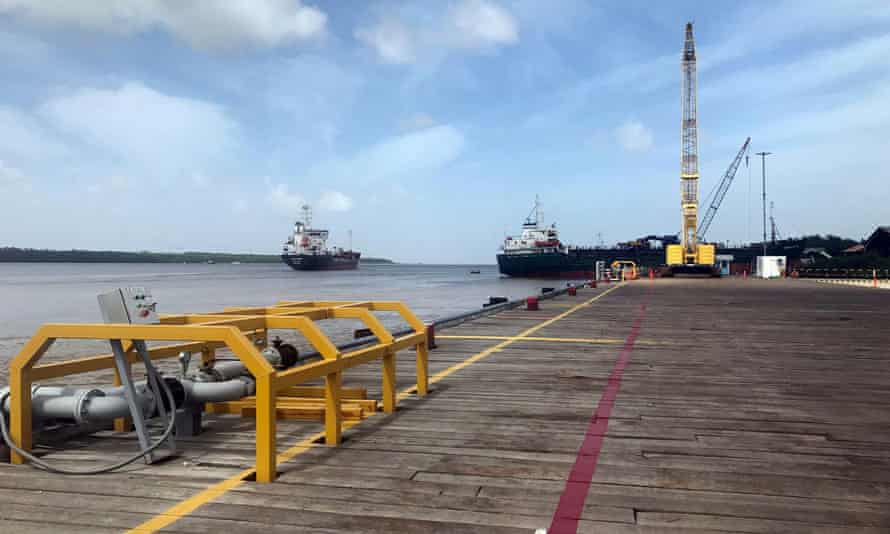Case is first in Caribbean to challenge fossil fuel production on climate and human rights grounds

First published on Mon 31 May 2021 11.18 BST
Guyana’s government is being taken to court by two citizens seeking an end to offshore drilling by ExxonMobil and other large oil firms that will exacerbate the climate crisis.
The case has been filed by Quadad de Freitas, a 21-year old Indigenous tourist guide from the Rupununi region, and Dr Troy Thomas, a university lecturer and former president of the anti-corruption organisation Transparency Institute Guyana.
They claim Guyana’s approval of oil exploration licences violates the government’s legal duty to protect their right and the right of future generations to a healthy environment. It is the first constitutional climate case in the Caribbean to challenge fossil fuel production on climate and human rights grounds.
The discovery of oil and subsequent production-sharing agreements with some of the world’s largest fossil fuel firms have proved politically explosive in the small South American country, where about two-fifths of the population live below the poverty line of US$5.50 a day.
The multibillion-dollar Stabroek exploration block off the coast of Guyana is a joint-venture between the oil firms ExxonMobil, Hess Corporation and a subsidiary of the China National Offshore Oil Company. ExxonMobil estimates at least 8bn barrels of crude oil lie under the sea, as well as trillions of cubic feet in natural gas.
The block is ExxonMobil’s largest oil development outside of the US Permian basin. The company began producing oil from the first deepwater project stage, called Liza-1, in late 2019 and expects to start Liza-2 in early 2022. It approved investment in a third project, Payara, last year and is eyeing up more for the future.
Guyanese campaigners had previously challenged the government’s approval of drilling licences on the grounds that only one of the joint-venture partners had an environmental permit. The judge ruled against the campaigners and that case is at Guyana’s court of appeal.
A second case challenging the length of the environmental permits granted for the first two exploration projects was successful. These will no longer expire in 2040 but in 2021, so ExxonMobil will have to reapply for a permit in the next month.
Campaigners want the court to declare that the government’s constitutional duties require it to stop authorising activities that would contribute significantly to climate change, ocean acidification and/or sea level rise. They say 92m tonnes of greenhouse gases will be emitted directly during the operation of the first three projects alone – and many more when the extracted fuels are burned.
“This is a classic public interest case,” said the lawyer Melinda Janki, who is representing the claimants in court. “In 2001-02 I lobbied the Guyanese government very hard to put the right to a healthy environment in the constitution. It’s in the interests of everyone to know what the law means, whether this oil production amounts to a violation of the right to a healthy environment. It’s then going to be up to the government to decide what actions to take.”
Janki stressed that Guyana was extremely vulnerable to climate change. Its capital, Georgetown, lies below sea level and fishing is key to many people’s livelihoods.
Last year, the UN’s Human Rights Committee asked Guyanese authorities to respond to concerns that large-scale oil extraction significantly increases greenhouse gas emissions and adversely affects the most vulnerable groups.
Janki said there had been great pressure on Guyana to produce oil alongside a narrative that it would bring the country great wealth, “which is not borne out by the facts”.
You end up with a great disparity between rich and poor, massive environmental destruction, serious human rights abuse. You only have to look at Venezuela next door to see what happens.”
Despite pledging not to fund fossil fuel extraction directly, the World Bank has long facilitated Guyana’s entry into the world of oil exports. It helped the country draft petroleum legislation in the 1980s – well before the discovery of any reserves – and more recently paid for those laws to be rewritten by a legal firm that worked regularly for ExxonMobil.
Guyana is a carbon sink and has committed to going 100% renewable under the Paris agreement provided the funding is available.
“There’s absolutely no reason it should now be trying to produce oil at a time when everyone’s moving away from fossil fuels,” said Janki.
